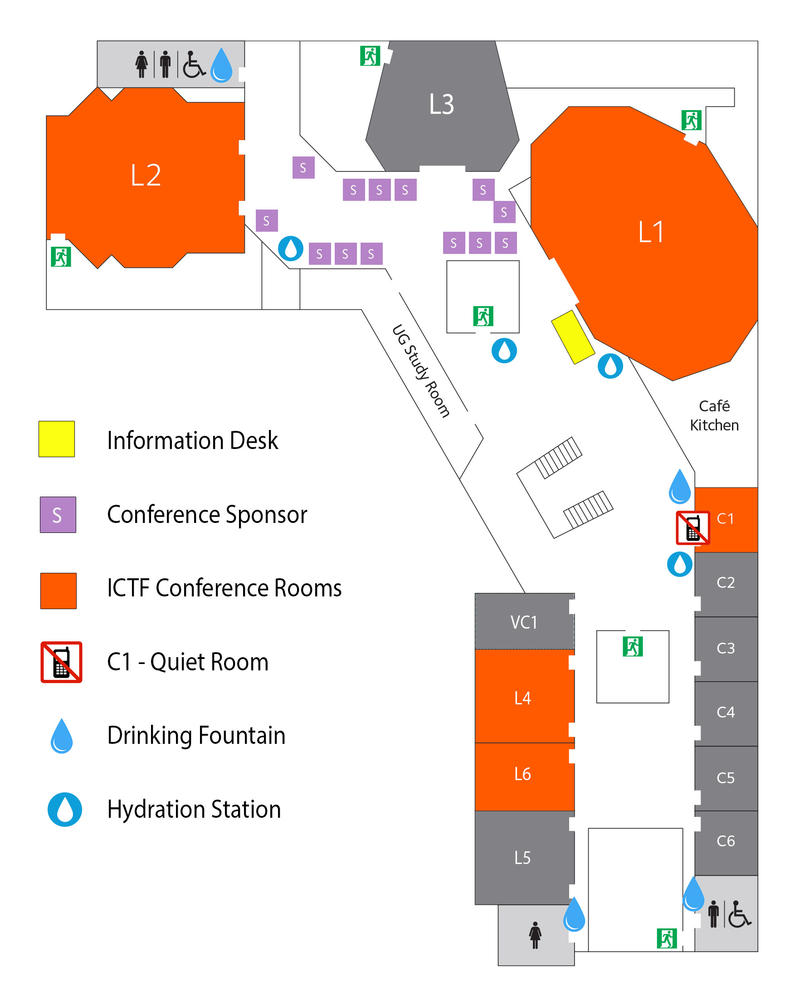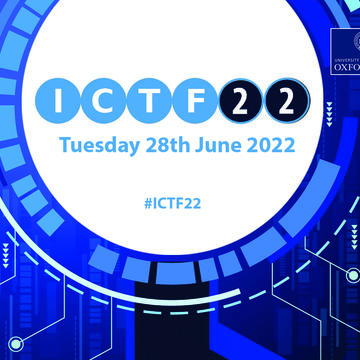ICTF Conference 2022
Recordings of the plenaries and breakout sessions are now available on the ICTF Stream Channel (Please note these are only visible to members of the ITSS community team)
Agenda
8:30 - 9:10 Registration, Pastries and Coffee
9:15 - 9:30 Welcome and Introduction
9:30 - 10:20 Plenary 1 - From Automation to Zedonks: forces shaping the future of customer and employee experiences - Nicola Millard, Principle Innovation Partner, BT
10:30 - 11:10 Breakout Session A
11:10 - 11:35 Tea/Coffee Break
11:40 - 12:30 Plenary 2 - Future and Vision of the Metaverse and Immersive Learning - Leticia Jauregui, Meta
12:30 - 13:25 Lunch
13:30 - 14:10 Breakout Session B
14:20 - 15:00 Breakout Session C
15:00 - 15:25 Tea/Coffee Break
15:30 - 16:20 Plenary 3 - Managing the Risks: Sharing the responsibilities - Liz Barnes, Vice Chancellor and Chief Executive, Staffordshire University
16:20 - 16:30 Conference Close and thanks
16:30 - 16:45 Head to Keble College, Hayward Quad for Evening Barbeque
For the first time, this year's conference is a hybrid event.
If you have registered or wish to register for the conference as a virtual attendee, you can use the link on this ITSS Wiki page to access the Zoom events platform. You must use the email account you used to register to log into Zoom (this may require a new zoom account log in).
Breakout Session A
Richard Carpenter from Humanities IT, University of Oxford will speak about the Unified Write Filter, a feature of Windows 10 which allows you to restore to a set image after every restart and how this is deployed in the Faculty of Asian and Middle Eastern Studies.
The journey to digital accessibility often begins with an audit of existing sites and systems, and a retrofit exercise to fix issues identified. While necessary for systems already in place, this approach is costly, time-consuming and can deliver less-than-optimal results. A much better approach is to ‘shift’ the effort ‘left’ to the earlier stages of the IT delivery process, baking-in digital accessibility skills and activities at every step.
Oxford University’s IT Services department have been discussing tools and techniques for doing accessibility better throughout the delivery workflow - from requirements analysis, through design, build and testing, while considering the opportunities and challenges of accessibility in relation to business change. Join them as they walk through a journey illustrating what they have been experimenting with to-date, and where they hope to be going next.
In this presentation, Marina Jirotka from Computer Science at University of Oxford, will discuss the research from her EPSRC Established Career Fellowship called RoboTIPS: Developing Responsible Robotics for the Digital Economy.
She will focus on the work merging socio-legal and technical responses in its development of an ethical black box (EBB). Black box ‘flight recorders’ are familiar from aviation and RoboTIPS is developing its EBB for use in social robots to provide data for use in the investigation of accidents and incidents. Crucially, it is not the data alone which is to be relied on in such investigations – the work draws on the important social aspects of investigation surrounding the data.
This approach to new notions of responsibility that can emerge through novel configurations of technology, society and governance is being expanded throughout the newly launched Responsible Technology Institute (RTI) at Oxford. The RTI’s related projects include the Trustworthy Autonomous Systems (TAS) project RoAD, which investigates the use and value of the data recorded by autonomous vehicles, and a new TAS-Responsibility project RAILS, which takes the socio-technical work further into the challenges of changing systems in changing environments. The work of all these projects draws on interdisciplinary understandings to establish new ways of considering ‘responsibility’ that can address the challenges outlined above.
Join the University of Oxford's CISO, Head of GRC and Head of OxCERT for an informative session covering:
- A review of the contemporary threats.
- What we have done for previous research and what capabilities we have today.
- Plans for the future; where do we need to get to over the next few years and the cross-over with University digitisation.
Breakout Session B
In this presentation, Akshay Anand will examine each of the seven ITIL 4 guiding principles and highlight the implications of the guidance for teams.
He will share a deeper understanding (developed through his time as a Lead Architect and Product Ambassador that ITIL 4) that will allow you to get greater value from applying the principles.
How we used Micro Services and Elastic Stack for file monitoring in Bodleian Libraries - A Demo - L4
The “Digital Preservation Micro Services and Reporting” (DPMS) service is used for tracking approximately 58 million files (300TB of storage) held across six of Bodleian Libraries’ digital repositories. The DPMS service gathers file system information, calculates checksums, and reads technical metadata from files held in the repositors. This information is aggregated into a series of JSON formatted log files, all of which are sent to OxCERT’s Elastic Stack SAVANT for indexing.
By comparing monthly logs in Elastic search, file level changes can be monitored. Unusual behaviour (such as large-scale file deletions or file corruption) can be highlighted, a particular benefit for dormant collections of files which retain long-term value. Grafana and Kibana (part of the Elastic Stack) are used to visualize this information and allow users to build interesting queries about the content and makeup of the monitored files.
Previously the service was used to monitor selected Bodleian Linux servers using NFS storage connections, but as of February 2022 the service has been extended to scan CONNECT storage for several Windows systems using the CIFS connector.
This session by John Ireland, Director of Customer Services at IT Services University of Oxford, will cover recent work to bring environmental sustainability factors into the design, delivery and direction of IT, with takeaways that you can apply in your domain right away. We’ll introduce the context and key concepts in assessing the environmental impact of IT and associated procurement, delivery and use activities. You’ll find out what has been achieved centrally already, and about work going on through the University IT Strategy to add environmental considerations into IT decision-making. We’ll also take a look at some practical ways in which IT providers and consumers can help reduce the impact of University operations on the environment.
Federico Stillitano is a Senior Design Consultant at IBM, where he helps large-scale enterprises address business issues and identify growth opportunities from a design angle. He has led over 40 design thinking sessions with over 15 clients of varying sizes across several industries. He regularly holds talks about topics like User-Centred Design, Emerging Technologies, Ideation, and Storytelling.
Enterprise Design Thinking is the framework IBM uses to collaborate, align teams, and form intent to solve users’ problems — all while improving customer experiences. EDT focuses on user-centred outcomes, providing tools to assess the feasibility and impact of solutions derived from the ideation stage.
Rapid Prototyping complements Design Thinking by allowing ‘practitioners’ to quickly develop the identified solutions at different levels of fidelity - at different stages of the process - to bring ideas to life and show what IBM refers to as ‘the art of the possible’.
Breakout Session C
During the pandemic MSD IT Services Oxford was asked to provide and manage an IT System to run the university's Early Alert Service. Over 15,000 PCR tests were managed and over 100,000 LFD results were delivered in around 18 months. Working with the Oxford University Hospitals NHS Trust and numerous parts of Professional Services in our University this was a fast-paced, agile, and collaborative effort. Come along to find out what we did, how we coded, what we learned, and how many releases we did!
As covid restrictions forced new ways of working, hybrid teaching - where some of the staff and students are together in a room, while others are remote – became a reality for many over the two years. This session will look at what we have learned from implementing this at Oxford, with input from the HyTeL project at the Department for Education and the Centre for Teaching and Learning.
Join Nandy Millan, the Digital Innovation Manager at University of Oxford as she gives an introduction to the new innovation pathway to take ideas to market.
Presenting resources as cloud now provides a familiar access mode for many research disciplines. For large-scale HPC and ML, optimal infrastructure is still best provided as on-premise, often in siloed systems that can create a disjunct in operation or service, but recently, however, such systems can be delivered in a cloud-native form.
Hybrid cloud in which on and off premise resources can be exploited promises the best-of-both-worlds as research organisations explore the most cost-effective way of providing computational resources across the full gamut of education and research.
In this talk we present an overview of the evolution of the on-premise Cambridge cloud and how we are presenting clusters via a CaaS portal that can be used to create and manage platforms, heralding a path to wider and fairer usage of resources.
Conference venue map





